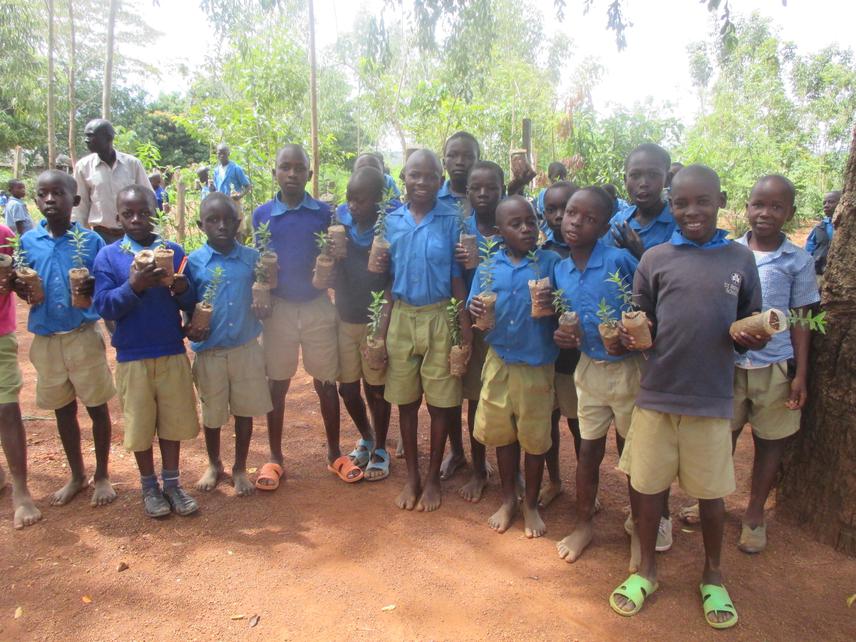Erick Otieno Odhiambo
Other projects
2 Dec 2015
Integrated Village Agroforestry and Energy Efficient Cook Stoves Installation for the Restoration and Conservation of Aduwa Hills Forest Catchment, Siaya, Kenya I
Out scale the construction of 240 energy efficient cook stoves in the Western sections of the forest, equip 3 Site Support Groups with Village Agroforestry Centres for breeding indigenous tree seedlings for Forest rehabilitation and income generation, Strengthen forest conservation knowledge gaps through community and school outreaches, equip the rock miners with indigenous poultry structure stocked with 100 birds for livelihood earning alternative, enhance proper waste management in the three forest adjacent schools through installation of waste separation and collection structures and intensify community involvement in birds conservation through strengthening weekly bird walk activities and trainings.

Environmental club members of Rapudo Primary with seedlings during school outreach
Aduwa Hills Forest is one of the three Forest Hills catchments in Siaya County, located in Central Alego covering approximately 2850 ha. The catchment is adjacent to Yala wetland and is a major tributary for River Nzoia which feeds Lake Victoria. The ecosystem hosts several Wildlife species of various IUCN classification amongst which includes Endangered Elephants shrews, Vervet Monkeys, Baboons, Hare and Antelopes. Common birds includes White-spotted Flufftail, Red-chested Owlet, Yellow-billed Barbet, and African Shrike-flycatcher amongst others. Common trees are Tabernaemontana stapfiana, Macaranga kilimandscharica, Croton megalocarpus, C. macrostachyus, Drypetes gerrardii, Celtis africana, Prunus africana, Neoboutonia macrocalyx and Albizia gummifera. Despite its numerous ecological importance, it still faces severe threats like encroachment for farming and settlement, forest fires, unsustainable harvesting of timber/wood-fuel, poaching and in turn these have led to biodiversity destruction, wildlife migration, decrease in soil water recharge, increased flash floods during rainy seasons contributing to pollution and general flooding in Yala swamps and Budalangi along the Nzoia-Kanyaboli plains.
This project therefore seeks to counter the above mentioned challenges by out-scaling the construction of 240 energy efficient cook stoves in the Western sections of the forest, equipping 3 Site Support Groups with Village Agroforestry Centres for breeding indigenous tree seedlings for Forest rehabilitation and income generation, Strengthening forest conservation knowledge gaps through community and school outreaches, equipping the rock miners with indigenous poultry structure stocked with 100 birds for livelihood earning alternative, enhancing proper waste management in the three forest adjacent schools through installation of waste separation and collection structures and intensify community involvement in birds conservation through strengthening weekly bird walk activities and trainings. In turn, this project shall lead to strengthened habitat protection, conservation and improved community understanding on their roles in its conservation alongside introduction of sustainable forest management techniques. The ultimate goal is to foster improved habitat regeneration through tree plantings, reduced vegetation clearance through introduction of energy efficient cook stoves, introducing alternative livelihoods improvements initiatives to reduce pressure on the over-reliance on forestry products including banning of illegal logging and hunting of wild animals for population increase.